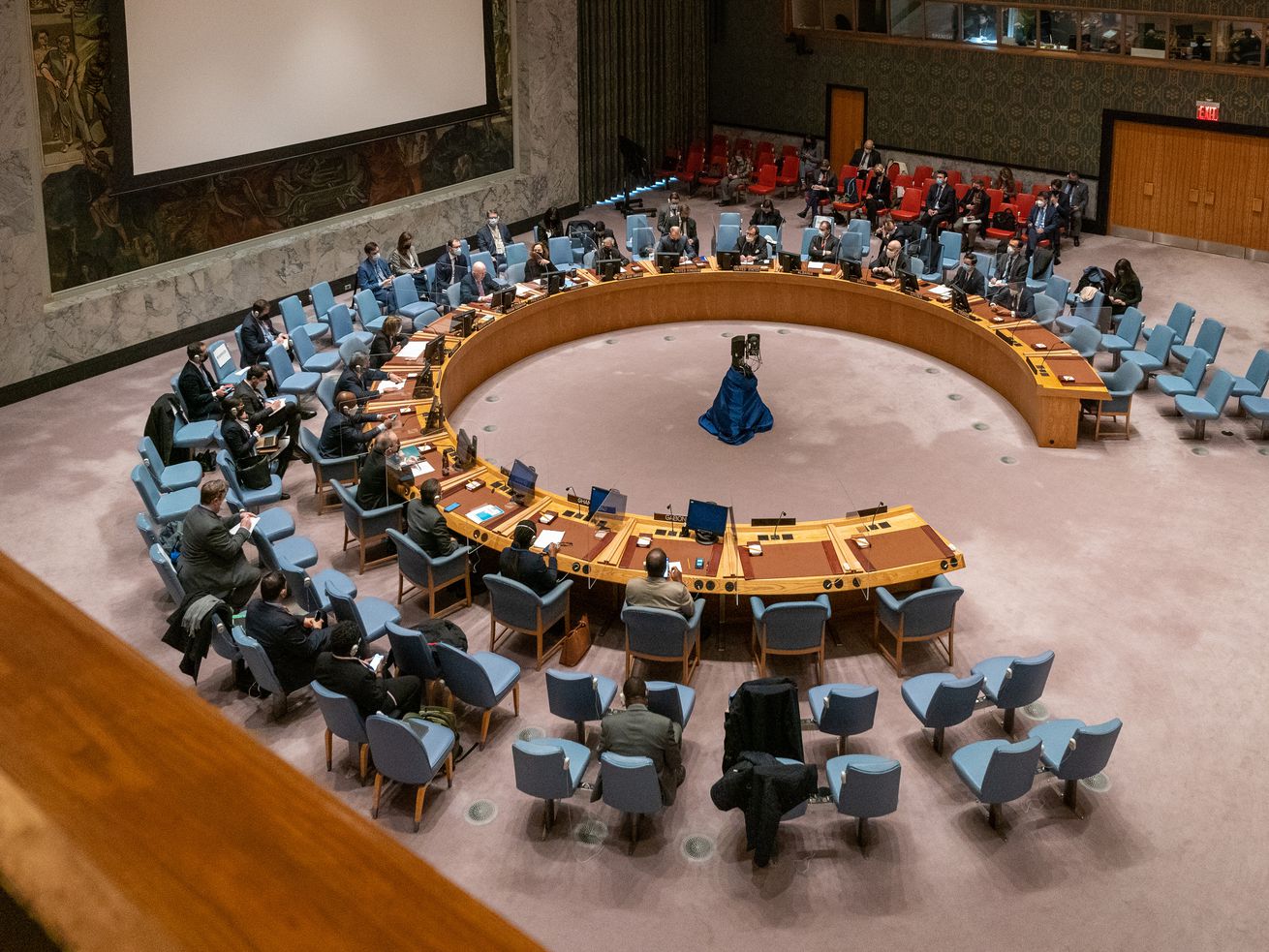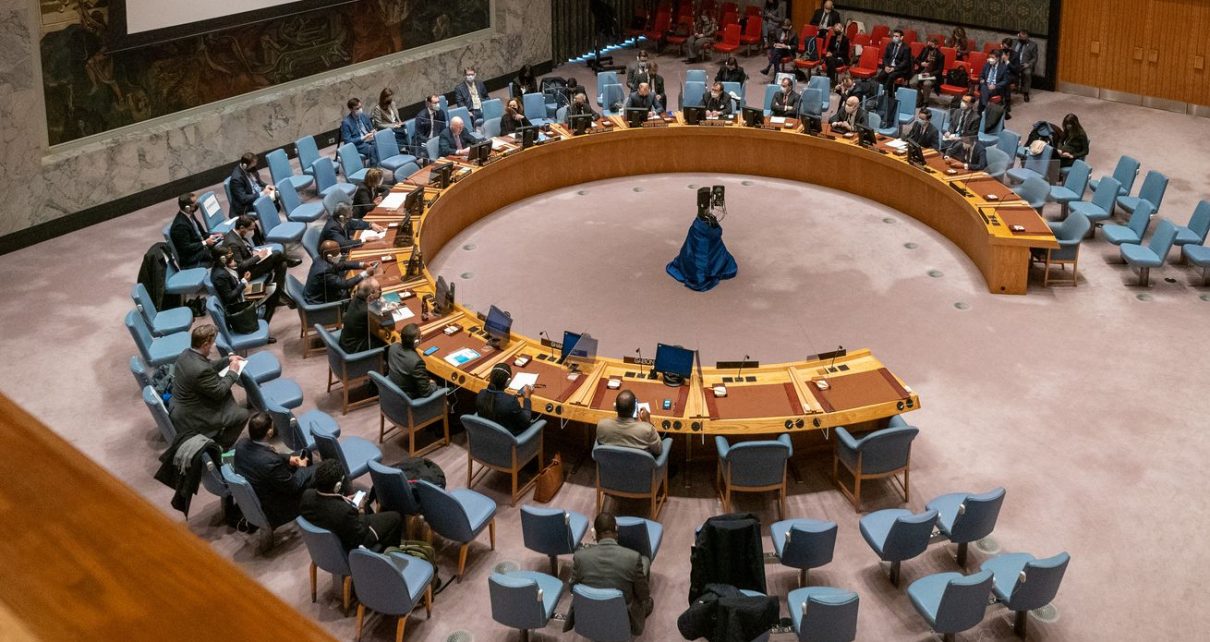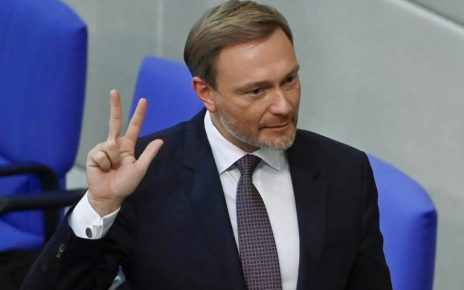
Putin’s nuclear threats prove the need for disarmament.
Europe’s first major war in decades is bringing with it renewed concerns about the possibility of nuclear conflict. Announcing the invasion of Ukraine last month, Russian President Vladimir Putin warned that countries that try “to stand in our way … must know that Russia will respond immediately, and the consequences will be such as you have never seen in your entire history”; just days afterward, he raised Russia’s nuclear readiness and put nuclear troops on high alert, evoking Cold War comparisons.
There’s little reason, as things stand, to think things could spiral into nuclear war, but as one expert told Vox’s Neel Dhanesha at the beginning of the invasion, “I’m more worried than I was a week ago.”
Beyond the immediate worry, though, Putin’s saber-rattling is a potent reminder about the state of international arms control, which has made little headway — when not actively backsliding — in recent decades.
“I think the scope of it matters,” Joshua Pollack, a senior research associate with the James Martin Center for Nonproliferation Studies, said of future arms control agreements. “I really think it is not global, I really think it is regional. It is the Europeans above all, because they can see that, once again, they are the ones whose countries would be the battlefields.”
Vox spoke with Pollack, who is also an editor for the journal Nonproliferation Review, about the history of arms control and what the future of the nuclear-armed world could look like.
The conversation, edited for length and clarity, is below.
Ellen Ioanes
I wanted to start by talking about how diplomacy has gone around new nuclear proliferation or nonproliferation, in the past decade? Because it seems like there’s been some efforts, but certainly some treaties have expired. And so where are we with that now?
Joshua Pollack
We’ve seen a real hardening of the partisan divide in this country over this question, to back it up a little bit. Before the decade mark, I would point to really the start of the divergence being in the 1990s. There was a general, if not unanimous, support for the START treaty, which was the first really big US-Soviet, and then US-Russian, arms control treaty that actually reduced numbers of nuclear weapons that could reach each other’s country — strategic weapons, as we call them. That one entered into force in 1994 — it was finalized mostly during the Bush administration, and took effect under Clinton. But by that time, the cracks were starting to build and Republicans were starting to believe that in the post-Cold War world, we were a sole superpower and didn’t have to accept any restraints. So, there was some hard bargaining over the Chemical Weapons Convention that finalized around then, banning chemical weapons and pledging their complete destruction.
The head of the Senate Foreign Relations Committee, Jesse Helms, didn’t want to let the treaty out of committee, even though the United States had no interest in having chemical weapons anymore, and could only benefit from the treaty. He got the Clinton administration to agree to dismantle the semi-independent Arms Control and Disarmament Agency and fold its functions into the rest of the State Department. And that was the price for getting a vote, which did lead to the adoption of the Chemical Weapons Convention. Then the Comprehensive Nuclear Test Ban Treaty was due to come up for ratification, and the Republicans almost to a man voted against it. It had become a partisan issue. It didn’t matter that this had been sought by presidents of both parties going back decades. They had adopted a different view on the nature of American power and the nature of our strengths and believed that any commitment, any constraint — although we have no intention of testing nuclear weapons, again — was illegitimate ipso facto, and it was a real low moment.
When the [second] Bush administration came in, they actually used the withdrawal provision to get the country out of the Anti-Ballistic Missile Treaty that had been in place since 1972. That limited what kind of missile defenses both sides could deploy. [The administration] didn’t want to see any limits at all anymore. And ironically, to this day, we have not deployed defenses that are substantially in excess of those limits. In fact, I think with very slight modifications to the treaty — deployment locations, things like that — we could still be inside it. But the point was more to get rid of the treaties, in my view, than it was to actually deploy a working defense.
And the [second] Bush administration also pulled us out of an understanding which the North Koreans called the Agreed Framework. And when the Trump administration came in, we saw the same thing — [Trump] pulled us out of the Intermediate-Range Nuclear Forces Treaty, which barred the deployment of land-based missiles in Europe beyond a certain range — really, anywhere in the world by the US or Russia, but the point was to keep certain missiles out of Europe. And that turn, I think, has contributed to the present crisis in some ways, although it’s hard to say exactly how much.
The Russians are very upset about the idea that the United States could be deploying previously prohibited missiles into countries that had been inside the Warsaw Pact, or perhaps someday, even inside the Soviet Union. That has been an issue that has emerged in the Russian Foreign Ministry’s rhetoric. In fact, the State Department, its counteroffer to Russian demands, was to play up that angle and say, “We’re open to talks on reaching some understanding about what weapons can and cannot be deployed in Europe.” [That] was consistent with demands that the Russians had made earlier, but it’s very hard to tell if there’s any real interest in that in Moscow.
Ellen Ioanes
And so is there a political framework now to change? Or is there the possibility of changing the way that political process happens, or that diplomatic process happens, in order to protect against the possibility that there will be that kind of Trumpian or Bushian desire to pull us out of these treaties [in the future]?
Joshua Pollack
I think, other than having a Democratic president, no. I mentioned that the Senate hasn’t ratified the Nuclear Test Ban Treaty. But there is an understanding between countries that once the treaty is signed, and before it is ratified, none of the signatories will do anything to violate its purposes. In other words, while all of its provisions may not come into play, and you may not have inspectors visiting certain countries or so on, you cannot take the actual actions that the treaty prohibits. So you can’t conduct nuclear tests that would violate the the purposes of the treaty until [it enters into force]. You can’t exercise a provision of a treaty that’s not enforced, so the supreme national interest clause is not available for use. There’s no ripcord to pull.
The CTBT [Comprehensive Nuclear Test Ban Treaty] is in this weird limbo where it has a long list of countries that have to ratify it or accede to it in order for it to come into force; that includes the United States, China, Iran, North Korea, and others. There’s a small handful of holdouts, but there are just a lot of political obstacles to making that happen. There’s even an international organization that exists to oversee the treaty. And they actually do have real work to do because they established a global network of sensors to detect nuclear tests, right?
They’re just kind of in limbo, working, but not all provisions of the treaty are in place. And that kind of works in a funny way. There’s no credible allegation that anyone is violating the treaty; there are persistent allegations from the United States that Russia or China interpret it differently and are willing to conduct some very small-scale experiments that violate how the United States interprets it. But no one has actually ever presented any evidence to that effect — it’s just the sort of rampant speculation that builds on itself. So this might be a way for arms control to survive this dry spell, I think — we negotiate treaties. And then we can sign them and obligate ourselves to them. But you actually can’t get out until you get all the way in.
It’s a terrible way of doing things. But if the Republicans are going to tear up every functioning treaty at the first opportunity now, it might be a way to get around that; it does limit what you can do, because it means that until a treaty formally enters into force, some of its provisions, like the specifics of inspections and so forth, just won’t function. But if you have other ways of conducting verification, the principle that you do nothing contrary to the purposes of the treaty could actually get you a long way.
Ellen Ioanes
I wonder if now, especially given the threat we might be seeing from Russia as well as, in a more positive light, the progress on the Iran deal — that could mean that there is appetite once again, on more of an international scale to try and deal with arms control in a real, sincere way.
Joshua Pollack
There’s certainly an appetite in Europe. The Germans are putting a lot of resources into it. They’re funding a lot of new think tank activities. I think it’s really quite telling that IISS [International Institute for Strategic Studies] — it’s a think tank based in London that has had a Washington office, among other things, for many years. They were established to deal with some of these military and security issues, especially weapons, but not exclusively. Their nonproliferation program is no longer based in London or DC. It’s based in Berlin now, because the German government was willing to put up some money to establish a new office for them there. And they decided that’s where they may go.
[And] there’s a newly expanded center on these things in Hamburg. We’ve just seen a lot of investment in Germany in particular, but I’m also seeing, you know, there’s a growing center on these issues at the University of Oslo. Norwegians are getting into it. The Norwegians were the original supporters of the Treaty on the Prohibition of Nuclear Weapons, which entered into effect last year. So a very anti-nuclear treaty that none of the countries that actually have the bomb are willing to go near, but I think it expresses the impatience of many other countries with those countries over their refusal to get serious about arms reduction, disarmament.
The Norwegians in the end did not join that treaty — the more conservative government came in, and they backed away from their support for that endeavor. But we are seeing in general a resurgence in European interest, and I think that will only increase in view of current events.
Ellen Ioanes
So given that, we might be seeing the beginning of a little bit more of a global appetite to deal with this and a real impetus to do it. What would it take to decommission nuclear weapons on a large scale, not just strategic but tactical?
Joshua Pollack
It’s been done before; the implementation of the INF Treaty involved the disposal of a large category of nuclear missiles. In fact, if you go to the Air and Space Museum downtown [in DC], you can see a couple of missiles there commemorating the INF Treaty, one American and one Soviet. They’re not actual missiles, just training models. After the collapse of the Soviet Union, the United States got involved in what was called the Cooperative Threat Reduction program where we sent a lot of experts and provided a lot of money to places like Russia, Ukraine, and Belarus, and Kazakhstan and the other post-Soviet republics, to help them with securing nuclear forces and disposing of a lot of outdated missiles, even a couple of missile submarines.
But in recent years, Putin has wound down those sorts of activities, even though it was free money. It was sort of humiliating, I think, for him to have the Americans in the Russian missile and nuclear complexes — well, missile, certainly, I don’t know about nuclear — poking around and overseeing the cutting up of old missiles. It just did not rub him the right way. Of course, even before that, the Bush administration nearly ended those activities. Because Don Rumsfeld and Condi Rice didn’t see why we should pay for any of that, even though it involves missiles that are aimed at our country. It was shocking to some of us that they would talk that way. Nevertheless, it did survive that moment; it was Putin who in the end closed it all down. But it served its purpose.
So there is experience with that. But I think the scope of it matters. You talked about global interest. I really think it is not global, I really think it is regional. It is the Europeans above all, because they can see that, once again, they are the ones whose countries would be the battlefields. Even though there are barely any NATO nuclear weapons left in Europe, just a couple hundred on a handful of bases. Not anything remotely like it was during the Cold War when it was well over 100 sites, and thousands of weapons. Now, it’s maybe 200 weapons.
Ellen Ioanes
Some of them, like the ones in Turkey, they don’t even have bombers to use them. They’re just kind of sitting there.
Joshua Pollack
Right, they are symbolic of a commitment that, in many ways, is past its expiration date. It’s just politically difficult to remove this last remnant of what was once called tactical or theater nuclear weapons in Europe. Ever since the big, anti-nuclear protests of the 1980s, NATO governments are not really wanting to talk about where they are deployed and when they would be used. But on the other hand, they also don’t want to change anything that might imply a shift, or diminishment of American commitment, that would bring the topic back into the public view. They just don’t like to explain their positions on these issues to their publics, who don’t want to talk about it anymore.
So change is really not high on anyone’s agenda. The last big change we had was in the first Bush administration, when most of the weapons in Europe were removed, and all the weapons were taken off attack submarines and surface ships. Basically, our current arrangement was established. So we’ve only seen marginal changes since then. If there was to be a revival in Europe, I would suggest that it would have to do with something along the lines of a revival of the INF treaty, but perhaps on a multilateral basis.
The INF treaty, or Intermediate Nuclear Forces [Treaty] — actually was not about nuclear forces per se, it was about missiles regardless of what they carried. Today, now that missiles are much more accurate, conventional missiles are a much bigger problem than they used to be. So the precise conventional missiles that are in the hands of not only the United States and Russia, but many other European countries, countries in Western Europe — this is a problem for the Russians. The Finns, who are right next to St. Petersburg, have long-range, air-launched cruise missiles from the United States. The Poles have the same missiles, the Germans and the Swedes have built their own versions. This is an uncomfortable situation for the Russians, increasingly. And I think that when, if cooler heads prevail, once this episode is over — it may take awhile — there’s reason to think that there could be interest in a multilateral understanding.
In East Asia, we just don’t see the same phenomenon. The South Korean public, for example, is increasingly enamored of the idea of returning US nuclear weapons to South Korea, because they also left at the end of the Cold War. And the former Japanese prime minister, [Shinzo] Abe, keeps on raising the idea of bringing American nuclear weapons into Japan, which is something the present prime minister, [Fumio] Kishida, who is from Hiroshima, is absolutely opposed to, and would be against long-standing practice in Japan.
But what we see is, in that part of the world, I think things are moving in the opposite direction. There’s sort of a fascination with nuclear weapons, because of the North Koreans, because of the Chinese build-up, even — there’s just this feeling that, “Oh, we can’t let them get away with this, we have to counter it somehow.”
But that’s not what nuclear weapons do. They don’t effectively counter other nuclear weapons. It’s not like they’re planes or tanks. They don’t fight each other on the border and keep an invading army out. They’re useful for breaking deep into someone else’s country and there’s really no complete defense against them, except for the threat of retaliation. So it’s just a very different mindset, and one that I think many people have never fully internalized. Thinking about nuclear weapons, there’s a tendency to treat them as if they were just big, conventional weapons, which they’re not.





